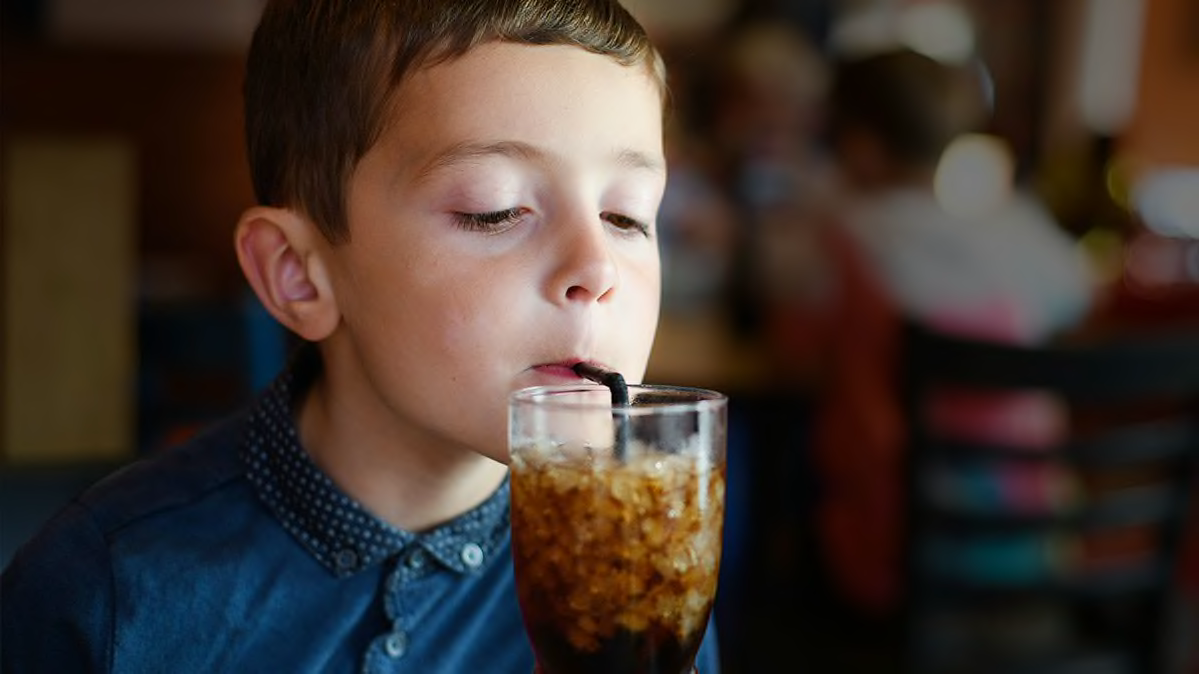Diet Vs Sugar Soft Drinks Kids

The amount of no- and low-calorie sweeteners that kids and teens get in their diets has increased 200 percent in recent years.
But obesity rates in this group have been rising, too, with more than a third of those ages 2 to 19 overweight or obese, according to data from the National Health and Nutrition Examination Survey (NHANES).
A new study published in the journal Pediatric Obesity suggests one reason for this surprising discrepancy: Kids and teens who drank beverages sweetened with sugar substitutes didn't take in fewer calories or sugars over the course of a day. In fact, those who drank these "diet" drinks consumed about 200 more calories than those who drank mostly water.
In adults, "We can clearly say that sugary beverages are bad for your health," says Vasanti Malik, Sc.D., a research scientist in the department of nutrition at the Harvard T.H. Chan School of Public Health, who was not involved in the new study that focused on children and teens. "But the research on low-calorie sweetened beverages is somewhat mixed."
Some studies have shown they help with weight loss, while others show no effect. And several studies have suggested that frequent consumption of these sweeteners may be linked to increased health risks.
This study, however, which was led by researchers at George Washington University, is the first to examine the link between these sweeteners and calorie intake in children.
What the Study Found
In the new study, the researchers analyzed NHANES data from 2011 through 2015, looking at what types of beverages 7,026 kids drank on a given day.
The beverages were divided into three categories—low-calorie sweetened beverages (which included diet sodas, artificially sweetened juices, sport drinks, and teas); sugary beverages (including sugar-sweetened sodas, sports drinks, fruit drinks, teas, dairy, and nondairy milks); and water.
They also looked at each child's total calorie and sugars intake for the 24-hour period.
Those who drank the most sugary beverages consumed an average of 312 more calories per day (156 calories from added sugar) than those who drank mostly water.
Low-calorie beverage consumers took in 196 more calories (60 calories from added sugars), and those who drank both got 450 more calories (184 calories from added sugars).
"The key takeaway from our research is that drinking beverages with low-calorie sweeteners instead of sugar doesn't necessarily add up to fewer calories in the diet," says study author Allison C. Sylvetsky, Ph.D., assistant professor of exercise and nutrition sciences at the George Washington University Milken Institute School of Public Health in Washington, D.C. "The kids who consumed mostly low-calorie sweetened drinks still had significantly higher calorie and sugars intake than those who predominantly drank water."
What the Study Doesn't Tell Us
As with much of the research showing a negative connection between nonsugar sweeteners and various health markers, the current study does not prove cause and effect. A one-day diet analysis can't reveal dietary patterns over a longer term.
"This snapshot can't answer the question of whether or not kids are drinking low-calorie sweetened beverages to replace sugary ones, and if so, is that beneficial?" Malik says.
Another limitation: "This data can't determine whether those beverages were at fault [for the higher calorie intake] or whether it was just a coincidence," says David Seres, M.D., associate professor of medicine at the Institute of Human Nutrition at Columbia University Medical Center in New York City. "But the study's conclusion that there is no evidence of benefit from low-calorie sweetened beverages is an appropriate assessment of the findings."
And a question that needs to be answered is where are those extra calories coming from?
"Because we didn't analyze food groups and specific food intakes, we can't say precisely," Sylvetsky says. "We also don't know if there's something going on metabolically [such as the sweeteners effect on insulin and blood sugar levels] or if the sweeteners are stimulating the appetite."
In other words, the taste of a low-calorie sweetened beverage may make people crave more sweets—like a handful of cookies.
Sylvetsky and her colleagues are currently digging deeper into the specifics of kids' diets using the NHANES data and hope to publish their findings within the year.
Possible Pitfalls of Low-Cal Sweeteners
Some studies in recent years have found evidence that consuming low-calorie sweeteners does not aid in weight loss or improve overall health. In a 2019 review of 56 studies evaluating the health effects of consuming sugar alternatives, the evidence was, at best, mixed.
The researchers concluded that, for most health outcomes—including body weight, heart disease, cancer, and blood sugar levels—there was little to no difference in those who consumed higher levels of nonsugar sweeteners and those who had little to none.
And there is also some evidence that higher consumption of low-calorie sweetened beverages actually contributes to weight gain and cardiovascular disease risk.
A 2017 review of 37 studies found that people who used low-calorie sweeteners were more likely to gain weight and have an increase in body mass index (BMI) and waist circumference. They were also more likely to suffer from high blood pressure, heart disease, and stroke.
Water Is the Best Drink
More research is still needed in this area, but in the meantime, experts agree that water is smartest drink of choice for people of all ages.
"Kids like sweetness, so it can be a hard sell to get children to drink plain water," Sylvetsky says. "But it's clearly the best option."
If you need to sweeten the deal for your kids, try adding just a splash of 100 percent fruit juice, a squeeze of citrus fruit or some crushed berries to plain or fizzy water.
Editor's Note: This article has been updated to correct the number of calories each group got from added sugars.
Diet Vs Sugar Soft Drinks Kids
Source: https://www.consumerreports.org/sugar-sweeteners/is-diet-soda-bad-for-kids/